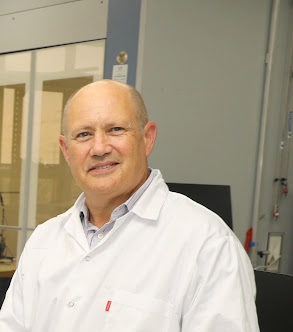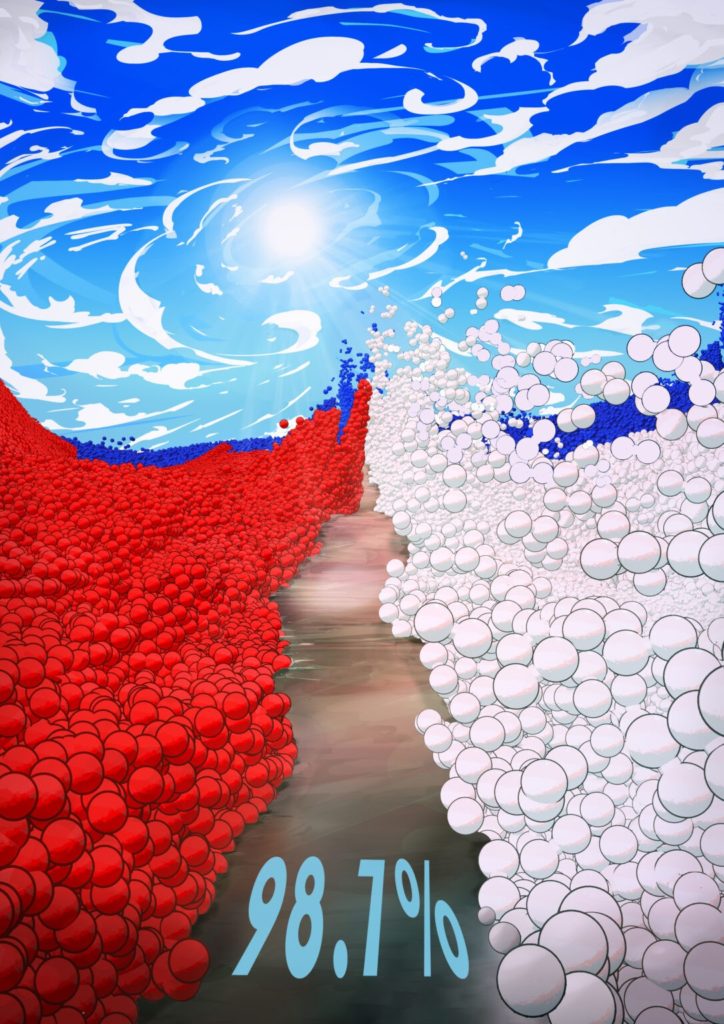Chemical Engineering and Process Engineering – From the Lab to Startup Companies

Prof. Gidi S. Grader and his research group study and develop ceramic materials with applications in the field of energy and produce “green” hydrogen with high efficiency. Prof. Grader recently received the Prime Minister’s Prize for Global Innovation in Smart Mobility and Alternative Fuels for Groundbreaking Research.
While studying for his BSc degree in Chemistry and Chemical Engineering at the University of California, Berkeley, studying organic chemistry was based on memorizing hundreds of catalytic chemical reactions and respective reaction conditions. Chemical Engineering, on the other hand, was based on a basic understanding of processes and real-workd problems. “I liked both directions, and worked a bit in a chemistry lab. After two years at Berkeley, studying organic chemistry, I decided to return to Israel to serve in the IDF for three years in the Golani Brigade,” says Gidi. “After the Army, when I went back to Berkeley to finish my studies, to my amazement I discovered that I had forgotten all the organic chemistry, and really had no will to memorize all the material once again. And so, I happily decided to continue in Chemical Engineering which had already attracted me much more.”

“I did my doctoral studies at Caltech, where I joined Prof. John Seinfeld’s wonderful research group that studied the behavior of dust particles called ‘aerosols’ in the atmosphere. I built a unique experimental system there that allowed me to study the properties of a single particle. I met my wife during that time, and got married before finishing my PhD. While working at Bell Labs, I was exposed to the synthesis of liquid-medium particles, sol-gel processes, and ceramic materials,” says Gidi. After 4 years (in 1990) and with two children, they decided to return to Israel, to the Technion.
As a faculty member at the Technion Department of Chemical Engineering, Gidi works with graduate students (and even undergraduate students in various settings) on innovative ceramic materials research studies, especially for energy applications, and on chemical processes related to hydrogen production. “I anticipate that the field of renewable energy will strengthen and gain significant momentum in the coming years. These issues are extremely diverse and also include the production of innovative materials and processes for environmentally-friendly burning of clean fuels, production of chemicals form carbon dioxide and natural gas in environmentally-friendly processes, and hydrogen production.”
Gidi has several notable collaborations that support the various research directions in his group. Within the Technion, there has been a long-standing collaboration with the group of Prof. Avner Rothschild from the Department of Materials Science and Engineering on the production of hydrogen from water, with Prof. Wayne Kaplan from the Department of Materials Science and Engineering on the effect of electric field on sintering of ceramic materials, and with Prof. Oz Gazit from the Department of Chemical Engineering as part of the development of catalysts and processes for creating molecules with added value from carbon dioxide and methane. Gidi also works with Rafael, the Hebrew University in Jerusalem, and with partners from Hanover, Germany and Lille, France, and with University of Louisiana. There is also a project with a French company called Hutchinson on the preparation of piezoelectric fibers. All of these projects involve graduate students from Gidi’s group.
Gidi’s research group mainly uses chemical methods and sol-gel processes for the synthesis of ceramic materials. This allows the preparation of nanometer-sized suspensions and powders that are used to create fibers or ceramic films, finally forming multilayer bodies. These materials undergo thermal treatments at high temperatures where they decompose, sinter, and reach their desired final structure. The final products are unique materials such as transparent ceramics and materials with extremely high thermal resistance.
In 2021, Prof. Gidi Grader, together with Prof. Avner Rothschild, won the Eric and Sheila Samson Prime Minister’s Prize for Global Innovation in Smart Mobility and Alternative Fuels, the world’s largest award in the field of alternative transportation fuels. This award was granted to the two researchers for their joint study of an alternative process for producing hydrogen from water, performed under the Grand Technion Energy Program (GTEP) and the Solar Fuel ICORE program (Israeli Center for Research Excellence). As part of these research programs, Gidi became closely acquainted with the research of Avner Rothschild, who studied the splitting of water in a photoelectrochemical cell. Avner’s cell contained two electrodes in one vessel, with a membrabe separating them. Gidi proposed to split the system so that the hydrogen and oxygen would be formed in two separate cells, without the membrane. Dr. Avigail Landman, a former graduate student of Gidi under the joint mentoring of Avner began working on this project. Initially the team worked on a direction that did not lead to positive results, since the hydrogen and oxygen electrodes (cathode and anode) were very far apart. The first breakthrough came after the idea of using auxiliary electrodes came up, where on the hydrogen side the auxiliary electrode is charged, and on the oxygen side the auxiliary electrode discharges. This breakthrough led to filing the first patent. It took another three years of R&D until the research team to publish the breakthrough in the prestigious journal Nature Materials. During the study, Avigail noticed that when the auxiliary electrode stood charged for several days (over the weekend, for example) it spontaneously discharges. The research team immediately realized that this discharge process can happen chemically without electricity and that it can be accelerated at a high temperature. Thus came the second breakthrough and the creation of a two-stage, electrochemical-thermochemical process, where in the first stage the hydrogen is produced at a low temperature while charging the anode, and in the second stage oxygen is chemically produced by heating the anode. The process is called E-TAC (Electrochemical-Thermally Activated Chemical). There is no need for a membrane in this process as hydrogen and oxygen are formed at different times, and the incredible hydrogen production efficiency is close to 99%. The team filed another patent for this process and published the work in another paper in 2019 in Nature Energy.

Gidi had a start-up company called Cellaris based on a unique foaming process developed in his lab, which can produce ceramic foams with a void fracture of about 98% (i.e., a durable material that is mostly air voids), which was sold to an Indian company that received the rights to use the process. In 2018, Prof. Gidi Garder, Prof. Avner Rothschild, and Dr. Chen Dotan founded H2Pro, which is based on the E-TAC process described above. The company started operating at the Technion with a small staff of 5 people, and then moved to its current site in Caesarea. The company deals with scale-up of the production process to industrial dimensions. Today, the company already has over 80 employees, many of them are Technion alumni. Just recently, a $75 million investment round was concluded that will enable the company to operate in the coming years and establish a manufacturing plant in the Galilee during 2023.
“There is no doubt that Process Engineering is at the core profession of Chemical Engineering,” says Gidi. “This core sets our discipline apart. The ability to scale-up chemical processes is a key pillar in the success of the ventures I have described, and in the success of other startups and the existing process industry. I highly recommend undergraduate students interested in graduate degrees to take the ‘final research’ course or a research project offered in our department, or work as a student in the labs of faculty members.”
“It is a great privilege to teach and perform exciting research at the Technion and at our department in particular with excellent students for many years,” says Gidi. “Our department is very family-like. We have been blessed with wonderful students who care about their friends, and the department. We have a lot of good will and a willingness to help each other, and we must preserve these qualities. I’d like to take this opportunity and ask our students to be our ambassadors outside the Technion, spreading the work about the exciting work that awaits additional candidate students.”